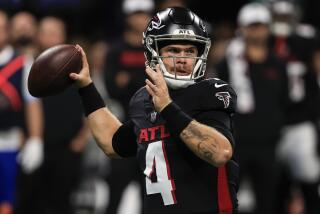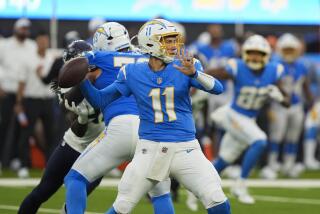Players Split on Rozelle Plan; Some Call It ‘Witch Hunting’
- Share via
Though agreeing that stronger measures are needed to fight the battle of drug abuse in the National Football League, reaction from local teams to NFL Commissioner Pete Rozelle’s decision Monday to implement random drug-testing was mixed.
“It’s witch hunting,” said linebacker Carl Ekern, player representative for the Rams. “And in America, we don’t do those type of things. There are enough avenues so that if a player screws up he can be approached, tested and helped in whatever fashion is set up. We don’t need to go searching for people, we don’t need to invade everyone’s privacy by spot checking. In America, it’s innocent until proven guilty. People fought and died to maintain those rights.”
But Howie Long, the All-Pro defensive end for the Los Angeles Raiders, feels just the opposite.
“It’s very apparent that something had to be done,” Long said. “I know Marvin Powell and Gene Upshaw (of the NFL Players Assn.) will condemn the whole thing and that’s fine. I just think something has to be done. We need to clean up the image of pro sports.”
But Raider player representative Mike Davis has a different opinion: “I think the commissioner is powerless in what he’s trying to do. By making this statement for all the world to see, he’s trying to save the integrity and the face value of the league.
“I just think he’s wrong in doing it the way he’s doing it. We’re dealing with an educational and morality issue. We’re opposed to drug use. We’re not playing tough guys in saying we don’t want random testing, but ultimately we want to be the ones to decide what we do and what we won’t do.”
San Diego Charger tight end Eric Sievers said he believes a majority of his team’s players would not object to random testing.
“There are some guys who are pro-union and might be against testing, even though they’re free of drugs,” Sievers said. “It certainly doesn’t bother me to have the test. We already had a urinalysis at mini-camp (in late May) and it doesn’t seem too hard to take two more drug tests this season.”
Rozelle, in the wake of recent cocaine-induced deaths of basketball star Len Bias and Cleveland Brown defensive back Don Rogers, outlined on Monday a seven-step program that includes two random drug spot checks for players during the season.
Ekern and other members of the Rams contacted basically held the union line, saying that Rozelle does not have the power to dictate policy without the consent of the players’ association.
Ram tight end David Hill said that while the deaths of Bias and Rogers have made the drug-testing issue a delicate one, it does not justify Rozelle’s decision.
“The way it is being enforced is almost like a lynch-mob,” Hill said. “It’s like sending out a posse to find out what’s going on. It’s taking away everything players have worked for all their lives.”
Hill then balked a little, saying, “It (drugs) is a problem. I hope another player won’t die before something is settled. . . . I knew he (Rozelle) would do something. He had to do something to save face and let the fans know something is being done. The union will fight it and I think there is just cause in doing it. We want to clean up the game, but we don’t want a dictatorship.”
Ram running back Mike Guman said he would consent to random testing if it were part of an agreement reached by players and management.
“There are so many sides to this,” Guman said. “There’s the question of invasion and constitutionality. I’m not opposed to testing as a player, we have to clean it up, and not just in sports. But we’re not fighting as individuals, we (the union) are a group. Our argument is not with the ruling, but with the way it’s being handled. We can’t do it that way. One person can’t determine what can be done.”
Ekern said he is aware of the public outcry over the deaths of Bias and Rogers. Ekern lives in Sacramento, about a 10-minute drive from where Rogers died.
“I’m painfully aware of what happened and the implications,” he said. “I’m very much aware of how that can be projected to the players. I’m not saying I’m against taking a harder stand, I’m just against the procedure he’s employed.”
Ekern said that he does not believe there is wide-spread drug use in the NFL and feels the current testing plan, with some improvements, could work.
“We have the basis for a very good program,” Ekern said. “It allows management to test people who have offended and to test people who they feel possibly have a problem. It also allows a player to have respect, confidentiality and a reasonable chance to retain his job and status on the team.”
Said Long: “Here’s the way I look at it. I’m making a bundle of money and if you ask cab driver in Philadelphia if he wanted to make a million a year and the only thing had to do was urinate in a cup three times a week, he’d probably ask what door he had to knock down to urinate in the cup. I feel very fortunate to be doing what I’m doing. If (Raider owner) Al Davis wants me to take urine test, it’s no problem.”
Members of the Chargers contacted also were in favor of Rozelle’s decision.
Chargers owner Alex Spanos, long an advocate of random testing, said he would have liked an even stronger step by Rozelle.
“It’s a move that has been needed for a long time, and I think it’s a great beginning to solving the problem,” he said. “I wish it had been a little more stringent, but I will certainly go along with what the commissioner wants.”
Spanos said he favors rehabilitation for first-time offenders but would like to ban repeat offenders from the NFL.
“I think the commissioner’s program will serve as a deterrent,” Spanos said. “I think players will think twice before getting involved with drugs.”
Safety Gill Byrd also favors the concept of random testing, but he would like to see some protection for players.
“Clearly, we need some form of testing, but I want to make sure the program is monitored fairly,” he said. “I’d like to be certain the tests will be administered by someone who is neutral, with no ties to either the individual club or the NFLPA.”
Staff writer Tom Farrey contributed to this story.



